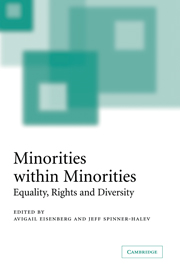Book contents
- Frontmatter
- Contents
- Notes on Contributors
- Acknowledgements
- Introduction
- Part I Toleration
- Part II Equality
- Part III Individual autonomy
- Part IV Self-determination
- 12 Identity and liberal politics: the problem of minorities within minorities
- 13 Internal minorities and indigenous self-determination
- 14 Self-determination as a basic human right: the Draft UN Declaration on the Rights of Indigenous Peoples
- Part V Democracy
- References
- Index
13 - Internal minorities and indigenous self-determination
Published online by Cambridge University Press: 22 September 2009
- Frontmatter
- Contents
- Notes on Contributors
- Acknowledgements
- Introduction
- Part I Toleration
- Part II Equality
- Part III Individual autonomy
- Part IV Self-determination
- 12 Identity and liberal politics: the problem of minorities within minorities
- 13 Internal minorities and indigenous self-determination
- 14 Self-determination as a basic human right: the Draft UN Declaration on the Rights of Indigenous Peoples
- Part V Democracy
- References
- Index
Summary
There has been a fairly persistent pattern of demands by minorities for group-differentiated rights, such as rights to political autonomy, and also sometimes exemptions from laws, at least since the late eighteenth century, when the state began to become more centralized, the rules and practices more standardized and uniform, and the requirements of the state more intrusive on local practices (Hechter 2000). From the 1848 Hungarian Revolution, when Magyars revolted from the Austro-Hungarian Empire to request their own political self-government arrangement, to agitation for “Home Rule” in Ireland in the eighteenth and nineteenth centuries, to various (indigenous) peasant rebellions against state-centered control in the Americas, minorities within the state have sought to wrest power from the central authorities governing them. More recently, there have been various demands by religious and ethnic groups for exemptions from the requirements and rules of the central political authority on religious or cultural grounds, and demands for self-government arrangements for national minorities and indigenous peoples, from Quebec in Canada, the Basque country and Catalonia in Spain, Scotland in the UK, Chechnya in Russia, Chiapas in Mexico, Kashmir in India, and from the Kurds in the south-east of Turkey.
The reasons for these demands are various, but, especially in the case of indigenous peoples, they tend to flow from a sense that the indigenous community constitutes a political community of its own, and that their aspirations to collectively manage their own affairs and govern themselves are legitimate.
- Type
- Chapter
- Information
- Minorities within MinoritiesEquality, Rights and Diversity, pp. 271 - 293Publisher: Cambridge University PressPrint publication year: 2005
- 8
- Cited by



